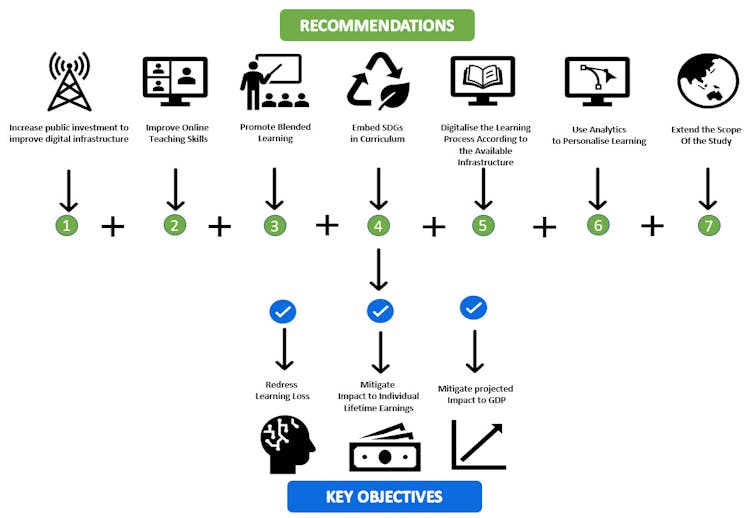
School closures and the shift to online learning due to the COVID-19 pandemic have resulted in learning loss in developed and developing countries. Learning loss is generally defined as any specific or general loss of knowledge and skills or reversals in academic progress when students are not in school.
A recent report jointly published by the World Bank, UNESCO and UNICEF stated the current generation of students risks losing US$17 trillion in lifetime earnings, or about 14% of today’s global GDP due to loss of learning caused by the pandemic.
According to a study by the OECD, the economic value of the projected learning loss is significant. In Australia, the loss is estimated to be US$1,716 billion, while in Indonesia it is around US$4,347 billion.
Recognising the growing global concerns around learning loss, researchers from Griffith University (Australia) and Universitas Pendidikan Ganesha (Indonesia) are collaborating on a joint project to better understand learning loss in our region.
The project has come up with seven key recommendations for mitigating the impacts of learning loss for children in primary, secondary and higher education sectors in Indonesia, Australia and the broader region as a result of the COVID-19 pandemic.
While the term learning loss is new to the education vernacular, the problem of digital equity and its impact on learning has been present for decades. The practices listed here in the recommendations are also not new to many educators.
However, when highlighted and applied side-by-side in this particular combination to address the issue of learning loss exacerbated by the pandemic, they provide a powerful remedy for this problem.
When situations are back to normal and schools have resumed operation and children returned to school, these recommendations will also be useful to improve digital equity, advance teaching skills and enhance personalised learning, which will result in higher learning outcomes.

1. Increase public investment in digital infrastructure
COVID-19 has highlighted the need for increased public investment in digital infrastructure. Compared to the global average of 60% of the world’s population with internet access, Indonesia currently has a lower proportion (54%) of its population using the internet.
Hence, we aspire that our role as educators, in partnership with the Indonesian and Australian governments and other stakeholders, is to co-design and implement a new and future-focused online centralised ‘Digital Learning Technology Hub’.
This will provide a compendium of remote learning tools and solutions and a platform for teachers and students in regional and remote areas of Indonesia to redress the educational divergence that has been exacerbated during the pandemic.
2. Improving online teaching skills
Some of the key challenges common in Australia and Indonesia in addressing the move to online teaching platforms included a lack of necessary skills required for online teaching, teachers and students both being unprepared for online teaching and learning, and a shortage of technical staff to support online learning.
In this instance, continuous capacity-building programs for teachers should be offered to enhance their online teaching skills and confidence.
3. Promoting blended learning
COVID-19 has changed how learning and teaching are carried out in mainstream education. During the pandemic, there has been increasing pressure for schools and the tertiary education sector to use blended learning - a combination between online and offline learning sessions - strategies more expansively.
Although initially, blended learning was perceived to be complex, a recent survey in Indonesia suggests 95% of Indonesia’s teachers now prefer using blended or distance learning.
Likewise, there’s currently a shift toward blended learning among both students and teachers in Australia.
When carefully designed, blended learning strategies can provide equitable learning experiences for both face-to-face and online cohorts of students.
This will assist in redressing future learning losses caused by adverse events such as COVID-19.
4. Embedding the sustainable development goals in curriculum
The current literature shows that introducing the UN’s sustainable development goals (SDGs) into the curriculum is important to equip students with the skills and knowledge to tackle global sustainability challenges, which learning losses have exacerbated.
Introducing the SGDs into the curriculum can address these challenges in several ways, such as with community case studies, online resource libraries, and programs that emphasise socio-cultural sensitivity and awareness.
At Griffith University, for example, SDGs have been embedded in the business and commerce curriculum, designed to enable the graduates to better cope with the impacts of the pandemic (for example, learning loss and other global challenges).
5. Digitising the learning process
During the pandemic, teachers have had no option but to cancel classes or shift their face-to-face practice to the digital sphere. Thus, the biggest challenge is to design classes online that will keep students engaged, and provide means to test students and give effective feedback.
Since not all children have the same access to digital devices, learning loss at the individual level has been experienced across the board, from kindergarten through to primary and secondary schools and the higher education sector.
While still in its infancy when applied to learning and teaching, studies show artificial intelligence could prove fruitful in our quest to remediate learning loss at the individual level. Machine learning, in particular, can accurately measure and understand a student’s self-regulated learning.
6. Using data to personalise learning
There are numerous benefits to using data in teaching and curricula.
First, teachers could use data to benchmark students’ performance among their peers, helping them understand each student’s specific needs and requirements.
And then, data analytics could provide specific educational instructions tailored to each student’s level of development.
Data could also help better assess each student’s progress.
In essence, data analytics would be useful to assess the extent of learning loss and allow for devising suitable learning strategies that are responsive to individual needs.
For example, see the framework for using analytics for personalised learning developed by the Victorian state government.
7. Include the tertiary sector in learning loss studies
The existing national study of learning loss in Indonesia by the World Bank has focused only on the impact of the pandemic on the kindergarten to high school sectors.
We aim to expand the scope of the existing study in investigating the impact of learning loss in the higher-education sector, both in Indonesia and Australia, as well as the wider region.
Danielle Logan-Fleming is a Learning & Teaching Consultant in the Griffith Business School, Griffith University. She is a member of the Australasian Society for Computers in Learning in Tertiary Education (ASCILITE) where she co-leads the Business Education Special Interest Group and co-Leads the 'Contextualising Horizon' Project. She has recently received funding in the form of a grant from an external organisation to undertake research on Learning & Teaching projects.
Kanchana Kariyawasam is an Adjunct Research Fellow of the Australian Centre for Intellectual Property in Agriculture (ACIPA) in Australia and a Member of the Law Futures Centre and Griffith Asia Institute (GAI) at Griffith University. She has received funding from various external funding bodies to undertake research and constancy projects.
Md Sayed Iftekhar is the Secretary of the Australasian Agricultural Resource Economics Society (AARES). He has received funding from Australian Research Council (ARC) and other industry funding to undertake research and consultancy projects.
Gede Rasben Dantes, Lanita Winata et Tommy Soesmanto ne travaillent pas, ne conseillent pas, ne possèdent pas de parts, ne reçoivent pas de fonds d'une organisation qui pourrait tirer profit de cet article, et n'ont déclaré aucune autre affiliation que leur poste universitaire.
This article was originally published on The Conversation. Read the original article.







